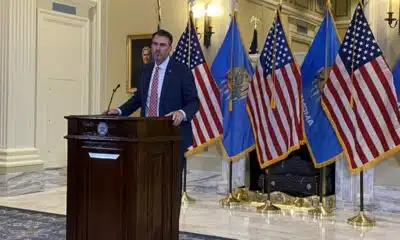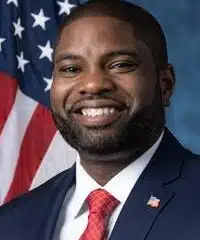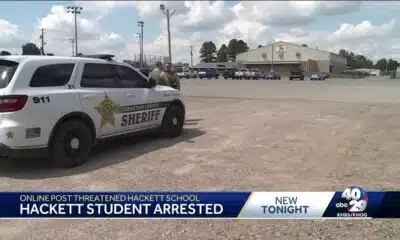News from the South - Alabama News Feed
Native American radio stations part of funding deal as US Senate takes up cuts to NPR, PBS
by Jennifer Shutt, Alabama Reflector
July 16, 2025
WASHINGTON — The U.S. Senate on Wednesday began debating changes to a bill that will cancel $9 billion in previously approved spending on public broadcasting and foreign aid — but with a deal for grants to some Native American radio stations that may help offset cuts to public media.
The vote-a-rama, which could extend overnight, represents a prime opportunity for Democrats to force GOP senators to vote on each of the proposed rescissions. And while it’s unlikely enough Republicans break with their party to substantially change the bill, key votes will serve as fodder for campaign ads heading into next year’s midterm elections.
The Trump administration sent Congress the rescissions request in early June, allowing the White House budget office to legally freeze funding on the programs in the proposal for 45 days.
The House voted mostly along party lines later that month to send the rescissions bill to the Senate, where Republican leaders have spent weeks addressing concerns raised by their own lawmakers.
At the center of the dispute is how cutting foreign aid for dozens of programs, including those addressing global health and democracy, would affect American influence around the globe.
GOP senators also raised qualms during a hearing about how eliminating funding for the Corporation for Public Broadcasting would impact rural communities and emergency alert systems.
The Corporation for Public Broadcasting provides funding for National Public Radio, the Public Broadcasting Service and hundreds of local stations throughout the country. In North Dakota, for example, the president of Prairie Public said he anticipates elimination of federal funding would mean a loss of about $2 million for his PBS station over the next two years.
South Dakota Republican Sen. Mike Rounds announced Tuesday he’s secured an agreement with White House budget director Russ Vought to move $9.4 million from an account within the Interior Department to at least two dozen Native American radio stations in multiple states.
Those include Alaska, Arizona, California, Colorado, Idaho, Minnesota, New Mexico, North Dakota, Oregon, South Dakota and Wisconsin, according to Rounds’ office.
Republican leaders also agreed to keep funding for the President’s Emergency Plan for AIDS Relief, or PEPFAR, whole by removing that rescission from the bill. PEPFAR is a global health program to combat HIV/AIDS launched by former President George W. Bush.
But those changes didn’t sway every Republican senator to support the bill. Maine’s Susan Collins, Kentucky’s Mitch McConnell and Alaska’s Lisa Murkowski voted against moving forward with debate on Tuesday night.
Vice President JD Vance casting a tie-breaking vote was the only reason the proposal advanced to the vote-a-rama, which began early Wednesday afternoon.
International disaster relief
Amendment debate kicked off with a proposal from Delaware Democratic Sen. Chris Coons to eliminate the $496 million rescission for international disaster relief funding, which he said “doesn’t just save lives around the world,” but strengthens American global leadership.
Missouri Republican Sen. Eric Schmitt argued against preserving full funding for that program, saying “many foreign governments and U.N. agencies have become reliant on U.S. emergency funding, using it to avoid investing in their own disaster preparedness.”
The amendment was not adopted following a 49-50 vote with Collins, McConnell and Murkowski voting with Democrats to strike the funding cut.
U.S. Senate staffers wheel pizza into the Capitol around 6 p.m. during a marathon voting session on July 16, 2025. (Photo by Jacob Fischler/States Newsroom)
Nevada Democratic Sen. Catherine Cortez Masto tried unsuccessfully to block any cancellation to Corporation for Public Broadcasting funding that would hinder public safety.
“For years public broadcasting has been essential to keeping Americans informed during severe weather and environment threats and broader public safety situations,” Cortez Masto said. “Let me give you an example from my home state.
“As the Davis wildfire raged in northern Nevada last summer the local CBS affiliate lost their transmitter in the fire. But thanks to public broadcasting services, CBS was able to air their local newscast and keep Nevadans informed about evacuations, the path of the fire and safety measures.”
Schmitt opposed the provision saying it isn’t necessary to ensure emergency alerts. The attempt to send the bill back to committee failed following a 48-51 vote, with Collins and Murkowski voting in support.
Congress and the Constitution
In a brief interview before voting began, New Jersey Democrat Cory Booker said the rescissions package undermined what was supposed to be a bipartisan budget and appropriations process.
He also objected to Congress giving away its constitutional authority for spending decisions.
“The reason why this is an assault, in my opinion, on the Constitution right now is because the powers of the Article I branch of government really are the budget, and we should be doing things together,” he said. “To rescind money that was approved in a bipartisan way undermines that spirit and that work.”
Sen. Thom Tillis, a North Carolina Republican who said he planned to support the bill, also raised objections to the process.
“I’m trying to have a positive view about how this rescission is going to be implemented,” he told reporters outside the Senate chamber. “It’s not near as prescriptive as I would like for it to be, but if they misstep, it’ll definitely influence my posture for future recissions.”
Jacob Fischler and Shauneen Miranda contributed to this report.
Last updated 6:52 p.m., Jul. 16, 2025
Alabama Reflector is part of States Newsroom, a nonprofit news network supported by grants and a coalition of donors as a 501c(3) public charity. Alabama Reflector maintains editorial independence. Contact Editor Brian Lyman for questions: info@alabamareflector.com.
The post Native American radio stations part of funding deal as US Senate takes up cuts to NPR, PBS appeared first on alabamareflector.com
Note: The following A.I. based commentary is not part of the original article, reproduced above, but is offered in the hopes that it will promote greater media literacy and critical thinking, by making any potential bias more visible to the reader –Staff Editor.
Political Bias Rating: Center-Right
This content presents a factual report on a legislative debate focused on budget rescissions affecting public broadcasting and foreign aid. It primarily highlights Republican efforts to cut funding and internal GOP divisions, while also noting Democratic strategies and the implications of the bill. The article refrains from strong editorializing and provides balanced coverage of GOP concerns and concessions, but the framing around Republican-led spending cuts and political maneuvering aligns it with a center-right perspective focused on fiscal conservatism and government spending reductions.
News from the South - Alabama News Feed
Study: Alabama’s moral turpitude laws contribute to racial disenfranchisement disparities
by Ralph Chapoco, Alabama Reflector
September 2, 2025
BIRMINGHAM — Robert Cheeks cast a ballot in Birmingham’s municipal elections last week and received a standing ovation from poll workers.
It was the first time that Cheeks, 82, had voted. Until the most recent election, his criminal history barred him from participating in the electoral process.
“I had never voted before and it was always my wish to vote,” he said after he cast his ballot. “I had the opportunity, encouraged, to vote, and I said I want to exercise my right as a citizen in the state, and I wanted to vote because I had never voted before.”
GET THE MORNING HEADLINES.
For Black Alabamians like Cheeks who have criminal convictions, getting the right to vote restored can be difficult, according to a new report from Return My Vote, an organization that assists people with criminal convictions with regaining their right to vote.
The study, “Alabama’s Moral Turpitude Law Disproportionately Strips Black Citizens of Their Voting Rights,” found that Black Alabamians were four times more likely to lose their right to vote than white Alabamians.
“The most basic, and most important, finding is that overall that people who were dropped from the voter file or denied registration due to felony conviction, a majority of them were Black,” said Richard Fording, a professor of political science at the University of Alabama and a co-author of the study. “Not a large majority, but over 50% of them were Black. It was about twice the percentage of the general population that is Black in Alabama, and so, of course that is alarming.”
Alabama laws generally deny the vote to those convicted of crimes of moral turpitude, a broad phrase that was subject to interpretation until the state began listing specific crimes under it in 2017. While some states automatically restore voting rights after a person completes a sentence, Alabama has a more complicated process.
While only a handful of crimes can permanently cost a person their vote, some require pardons from the Alabama Board of Pardons and Paroles. Others require a Certificate of Eligibility to Register to Vote once they have completed their sentence, which includes payment of any fines, fees and restitution.
The authors of the study studied 25,000 people removed from the voter rolls or disqualified from voting between 2017 and 2020 due to criminal conviction. Study authors were able to review the information only after the Campaign Legal Center had obtained the records after a federal judge had required the Alabama Secretary of State’s Office to release it.
Disparities
According to the study, Black men were disenfranchised at a rate of 22.4 citizens per 1,000 men of voting age. That is almost four times the rate for their white counterparts, whose rate was 6.7 citizens per 1,000.
The rate for disenfranchising Black women was 3.9 citizens per 1,000, almost twice the rate of white women, whose disenfranchisement rate was 2.1 citizens per 1,000 white women.
Counties with significant Black populations had some of the highest Black disenfranchisement rates and largest racial disparities in disenfranchisement. Seven of the 10 counties with the highest rates of disenfranchised voters are within the Black Belt. The rate for disenfranchising Black men in Monroe, more than 40% Black, was 40.6, compared to 8 per 1,000 for white men. In Perry County, with a Black population of 70%, the rate was 30 citizens per 1,000 Black men of voting age. The rate was 11.4 for white men, almost three times lower.
The disparities are less pronounced for women in the same counties, but they still exist. In Monroe County, Black women are disenfranchised at a rate of 5.6 citizens per 1,000 Black women who are at least 18 years old. For white women in that county, the rate is 2.4, less than half.
Study authors stated in the report that even though there is some uncertainty with the information because of problems collecting data, after reviewing the Uniform Crime Report data obtained from the FBI website, the findings indicated that more Blacks are disenfranchised than whites even when criminal convictions are considered.
“Nevertheless, the most important takeaway is that the disproportionate percentage of arrests for disqualifying offenses by Blacks in Alabama (42%) cannot fully account for the significantly higher percentage of Blacks disenfranchised by the state (52%) during 2017-2021,” the report states.
The study also found that Blacks have a more difficult time regaining their right to vote after they are removed from the voter rolls after getting convicted of a crime.
Authors also investigated the number of people who were removed from the voter rolls from 2017-2021 who had regained their voting rights and registered to vote once again by 2024. According to the study, 1,034 people who are Black reregistered to vote after they completed their sentence, about 8.3% of the total. That is less than the almost 13% of whites registered to vote after a criminal conviction.
The study suggested that the disparities could stem from disparities in the application of Alabama’s felony disenfranchisement law and uneven methods of voter file maintenance in the state.
“Regardless of the reason, the significant variation in county-level disenfranchisement rates calls for further investigation into how Alabama’s felony disenfranchisement law is being implemented at the local level,” the report said. “This is especially important given federal law that requires uniform implementation of state election laws across counties.”
‘It means so much’
Cheeks spent almost 40 years in the custody of the Alabama Department of Corrections after receiving a mandatory life sentence in 1985 for a robbery. Cheeks had prior convictions of forgery and assault, leading to the sentence but no one was physically injured. Cheeks spent 30 years working in the kitchen at Donaldson Correctional Facility in Bessemer without pay, according to Alabama Appleseed.
Cheeks was released in July 2022. His criminal convictions required him to obtain a Certificate of Eligibility to Register to Vote, which he applied for and received from the Alabama Bureau of Pardons and Paroles. Cheeks, with the help of supporters, then registered to vote with the Board of Registrars in Jefferson County and acquired full citizenship once again after spending nearly four decades incarcerated in Alabama’s prisons.
“It is more important now than it would have been in the first place,” Cheeks said of voting. “I have been so anxious over the years to vote. I have been hearing so much about voting, and I wanted to express my opportunity for the right to vote. It is granted to American citizens by right, and I wanted to do that. I am so thankful. It is a blessing, and it means so much.”
Independent Journalism for All
As a nonprofit newsroom, our articles are free for everyone to access. Readers like you make that possible. Can you help sustain our watchdog reporting today?
Alabama Reflector is part of States Newsroom, a nonprofit news network supported by grants and a coalition of donors as a 501c(3) public charity. Alabama Reflector maintains editorial independence. Contact Editor Brian Lyman for questions: info@alabamareflector.com.
The post Study: Alabama’s moral turpitude laws contribute to racial disenfranchisement disparities appeared first on alabamareflector.com
Note: The following A.I. based commentary is not part of the original article, reproduced above, but is offered in the hopes that it will promote greater media literacy and critical thinking, by making any potential bias more visible to the reader –Staff Editor.
Political Bias Rating: Center-Left
This content highlights issues of racial disparities and systemic barriers related to felony disenfranchisement in Alabama, focusing on the disproportionate impact on Black citizens. It emphasizes social justice concerns and critiques existing laws and their implementation, which aligns with a Center-Left perspective that advocates for voting rights expansion and racial equity. The tone is factual and empathetic, without overt partisan language, but the focus on structural inequalities and reform suggests a leaning toward progressive policy viewpoints.
News from the South - Alabama News Feed
Monroe County Football Coach speaks out, calls for more support for team
SUMMARY: Monroe County High School football coach Robert Wilkerson is urging more support from parents, alumni, and the community. Since starting in April, Wilkerson has faced challenges such as low game attendance, limited adult volunteers for filming and chain crew, and a lack of trainers. He publicly expressed concerns on Facebook, emphasizing the need for people to attend games and boost team morale. Wilkerson highlights issues like outdated training equipment and lack of pride in the school. He calls for increased community involvement through their “adopt a tiger” program and donations via an Amazon wish list to improve the team’s resources.
Head Coach Robert Wilkerson says building the team starts with more people attending games and helping the young players.
News from the South - Alabama News Feed
Alabama Lawmakers Threaten to Dismantle Athletic Association After New Rule | Sept. 1, 2025 | News 1
SUMMARY: Alabama lawmakers are challenging a new rule by the Alabama High School Athletic Association (AHSAA) that sidelines certain high school athletes using the $7,000 tax credit under the CHOOSE Act. Senators and representatives argue the rule violates state law, which protects player eligibility and opposes restrictions impacting athletes’ ability to participate. They call for increased oversight of the AHSAA and suggest revising or repealing the CHOOSE Act. Concerns focus on fairness but emphasize that opportunities for student-athletes should not be compromised. Some lawmakers are even considering dismantling the AHSAA due to these controversial regulations.
High school athletes who transfer schools using financial aid like the CHOOSE Act are ineligible to play for one year, according to the Alabama High School Athletic Association.
News 19 is North Alabama’s News Leader! We are the CBS affiliate in North Alabama and the Tennessee Valley since November 28, 1963.
https://whnt.com/
https://www.facebook.com/whntnews19
https://www.instagram.com/whntnews19/
https://twitter.com/whnt
-
Mississippi Today3 days ago
DEI, campus culture wars spark early battle between likely GOP rivals for governor in Mississippi
-
Mississippi Today7 days ago
Judge: Felony disenfranchisement a factor in ruling on Mississippi Supreme Court districts
-
News from the South - North Carolina News Feed5 days ago
Parasocial party: Why people are excited for the Taylor Swift, Travis Kelce engagement
-
News from the South - Louisiana News Feed6 days ago
K+20: Katrina alters local health care landscape, though underlying ills still the same
-
Our Mississippi Home6 days ago
The Great Backyard Recovery – Helping Birds After the Storm
-
Local News Video4 days ago
08/29 Ryan's “Wet End to the Week” Friday Forecast
-
The Center Square7 days ago
U-M Health ends transgender treatment for minors | Michigan
-
News from the South - Florida News Feed6 days ago
Man who shot ex-girlfriend died after shootout with deputies at apartment complex, MDSO says











































